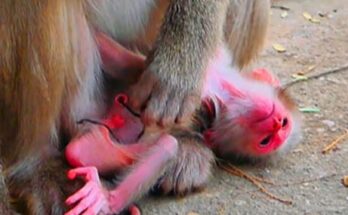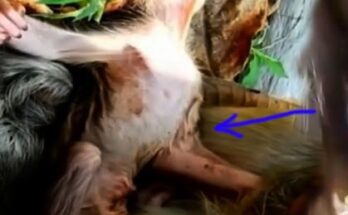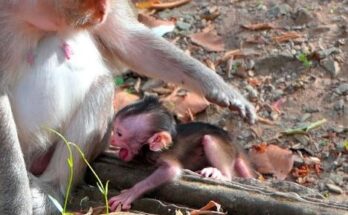In the animal kingdom, mother-offspring bonds are among the most profound and crucial for survival. From birth, a mother provides nourishment, protection, and guidance to her young, teaching them the essential skills they need to thrive independently. However, there comes a time when even the most doting mother must encourage her offspring to take the next step toward independence. For baby monkeys, the weaning process can be an emotionally charged and challenging period, often marked by resistance, tantrums, and heartbreak.
One of the most striking displays of this natural struggle occurs when a baby monkey, accustomed to constant maternal care, faces its mother’s firm decision to initiate weaning. This transition is not only vital for the mother’s health but also for the baby’s development, fostering independence and self-sufficiency. Yet, to the infant primate, this shift feels abrupt and unfair. Used to the comfort of nursing on demand, the baby often reacts with visible frustration, vocal protests, and even physical displays of distress, showcasing the depth of its attachment and dependence.
Weaning is a gradual process, but it is rarely a smooth one. In many primate species, including macaques and langurs, mothers begin to restrict access to nursing by pushing their babies away, walking off when they attempt to latch, or even swatting at them gently. To the baby monkey, this sudden change in behavior feels like rejection, and its response can be nothing short of dramatic. The infant might scream, cling desperately to its mother, or throw itself on the ground in a full-blown tantrum, much like a human toddler protesting bedtime.
Despite these emotional outbursts, mother monkeys remain firm in their approach. They understand that their baby’s survival depends on learning to eat solid food, interact with peers, and become more independent. By setting boundaries, they encourage their offspring to explore their environment, practice foraging, and develop social skills that will be crucial later in life. This “tough love” is not cruelty; rather, it is an instinctive strategy designed to prepare the young for adulthood in a world where survival requires resilience.
Scientists and wildlife observers have documented numerous cases of intense weaning struggles among primates. Some baby monkeys take longer to adjust, continually testing their mother’s resolve with persistent cries and physical demands. Others exhibit behavioral shifts, such as increased attachment to other troop members or temporary withdrawal from play and social interactions. However, as difficult as this period may be, most baby monkeys eventually adapt, realizing that their mother’s love and presence remain intact even if nursing is no longer an option.
Interestingly, the weaning struggle also highlights the intelligence and emotional complexity of primates. Researchers have noted that some baby monkeys attempt to manipulate their mothers by using guilt-inducing behaviors, such as exaggerated cries or refusing to eat solid food. In turn, some mothers display varying degrees of flexibility, with some giving in temporarily while others remain resolute. This dynamic is a testament to the deep social bonds and cognitive capabilities of primates, mirroring certain aspects of human parenting and child development.
While the process may seem harsh from an outsider’s perspective, it is a necessary and natural step toward maturity. The baby monkey’s angry reaction to its mother’s tough love is not a sign of cruelty or detachment but rather an essential part of its journey to independence. Eventually, the once-dependent infant will begin to thrive on its own, developing the skills needed to navigate its complex social world. And despite the temporary frustration, the mother-offspring bond remains strong, built on a foundation of care, teaching, and ultimately, preparation for the future.
In the end, the weaning struggles of a baby monkey serve as a fascinating reminder of the challenges inherent in growing up—whether in the animal kingdom or among humans. It is a universal truth that moving toward independence often comes with resistance and frustration, but it is through these struggles that strength and self-sufficiency are born.


